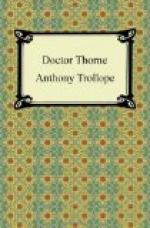One day, walking solitary in the lanes, she met that sturdy farmer to whose daughter she had in former days been so serviceable. ’God bless ‘ee, Miss Mary,’ said he—he always bid God bless her when he saw her. ’And, Miss Mary, to say my mind out freely, thee be quite gude enough for un, quite gude enough; so thee be’st tho’f he were ten squoires.’ There may, perhaps, have been something pleasant in the heartiness of this; but it was not pleasant to have this heart affair of hers thus publicly scanned and talked over: to have it known to every one that she had set her heart on marrying Frank gem, and that all the Greshams had set their hearts in preventing it. And yet she could in nowise help it. No girl could have been more staid and demure, less demonstrative and boastful about her love. She had never yet spoken freely, out of her full heart, to one human being. ‘Oh, Frank!’ All her spoken sin had been contained in that.
But Lady Arabella had been very active. It suited her better that it should be known, far and wide, that a nameless pauper—Lady Arabella only surmised that her foe was nameless; but she did not scruple to declare it—was intriguing to catch the heir of Greshamsbury. None of the Greshams must meet Mary Thorne; that was the edict sent out about the county; and the edict was well understood. Those, therefore, were bad days for Miss Thorne.
She had never yet spoken on the matter freely, out of her full heart to one human being. Not to one? Not to him? Not to her uncle? No, not even to him, fully and freely. She had told him that that had passed between Frank and her which amounted, at any rate on his part, to a proposal.
‘Well, dearest, and what was your answer?’ said her uncle, drawing her close to him, and speaking in his kindest voice.
‘I hardly made an answer, uncle.’
‘You did not reject him, Mary?’
‘No, uncle,’ and then she paused;—he had never known her tremble as she now trembled. ‘But if you say that I ought, I will,’ she added, drawing every word from herself with difficulty.
’I say you ought, Mary! Nay; but this question you must answer yourself.’
‘Must I?’ said she, plaintively. And then she sat for the next half hour with her head against his shoulder; but nothing more was said about it. They both acquiesced in the sentence that had been pronounced against them, and went on together more lovingly than before.
The doctor was quite as weak as his niece; nay, weaker. She hesitated fearfully as to what she ought to do: whether she should obey her heart or the dictates of Greshamsbury. But he had other doubts than hers, which nearly set him wild when he strove to bring his mind to a decision. He himself was now in possession—of course as a trustee only—of the title-deeds of the estate; more of the estate, much more, belonged to the heirs under Sir Roger Scatcherd’s will than to the squire.




